You’re about to discover how the right water-soluble support filament can transform your most challenging 3D prints from impossible failures into precision masterpieces. Whether you’re creating intricate overhangs, complex geometries, or delicate moving parts, your choice of support material will make or break the final result. The difference between amateur-looking prints with rough surfaces and professional-quality models lies in understanding which filaments deliver clean dissolution without leaving residue or damaging your carefully crafted designs.
PVA Filament 1.75mm 1kg Water-Soluble Support for 3D Printing
If you’re tackling complex 3D prints with overhangs, bridges, or intricate geometries, PVA filament’s water-soluble properties make it the ideal support material for dual extruder setups. This professional-grade 1.75mm filament delivers exceptional dissolvability and toughness without bubbles or warping. You’ll appreciate its compatibility with PLA, PETG, TPU, PVB, and PA12 materials for seamless printing experiences.
The filament maintains +/- 0.03mm dimensional accuracy and comes vacuum-sealed with desiccant for optimal preservation. Print at 190-220°C nozzle temperature with 50-80°C bed temperature for best results across all common FDM printers.
Best For: Makers and professionals using dual extruder 3D printers who need reliable water-soluble support material for complex prints with overhangs, bridges, and intricate geometries in PLA, PETG, TPU, PVB, and PA12.
Pros:
- Excellent water solubility with professional-grade quality ensuring clean removal without residue
- High dimensional accuracy (+/- 0.03mm) and tangle-free printing experience without bubbles or warping
- Vacuum-sealed packaging with desiccant and resealable pouch maintains filament quality and prevents moisture damage
Cons:
- Requires dual extruder 3D printer setup, limiting compatibility to more advanced printer configurations
- PVA material is hygroscopic and sensitive to moisture, requiring careful storage and handling
- Higher cost compared to standard non-soluble support materials like PLA or PETG
Polymaker PolyDissolve S1 PVA Filament, 1.75mm, 750g
Complex 3D printing projects with intricate overhangs, internal cavities, and delicate geometries demand reliable support material that won’t compromise your final print quality. Polymaker’s PolyDissolve S1 delivers precisely that reliability in a convenient 750g spool. You’ll find it’s specifically engineered for standard printing temperatures and works seamlessly with PLA, TPU, PVB, and Nylon filaments.
The filament comes vacuum-sealed with desiccant in eco-friendly packaging featuring a fully recycled cardboard spool. Print at 215°C-225°C nozzle temperature with 25°C-60°C bed temperature at 30-40mm/s speeds for ideal results. Always secure the filament tip in spool holes to prevent tangling and maintain consistent performance throughout your complex prints.
Best For: 3D printing enthusiasts and professionals who need reliable water-soluble support material for complex prints with intricate overhangs, internal cavities, and delicate geometries using PLA, TPU, PVB, or Nylon filaments.
Pros:
- Water-soluble support material that completely dissolves away, leaving clean finished prints without manual removal marks
- Compatible with multiple filament types (PLA, TPU, PVB, Nylon) and works at standard printing temperatures
- Comes vacuum-sealed with desiccant in eco-friendly recycled packaging to maintain filament quality
Cons:
- Requires careful handling and storage due to PVA’s sensitivity to moisture absorption
- Slower recommended printing speeds (30-40mm/s) compared to standard filaments may increase overall print time
- Water dissolution process adds extra time and steps to the post-processing workflow
PVA Water Soluble 3D Printer Filament 1.75mm (0.5KG Spool)
PVA water-soluble filament transforms your 3D printing capabilities when you’re tackling intricate designs that demand temporary support structures. This 1.75mm filament won’t dissolve at room temperature but softens at 55-60°C, allowing you to manually peel away supports without damaging your prints. You’ll appreciate its clog-free feeding and excellent bonding with PLA materials. Print at 190-200°C nozzle temperature and 55-65°C bed temperature, keeping speeds under 30mm/s. Store it properly in the included vacuum packaging since PVA absorbs moisture rapidly. The 0.5kg spool provides enough material for complex projects requiring extensive support structures.
Best For: 3D printing enthusiasts and professionals who need to create complex models with intricate overhangs, internal structures, or moving parts that require temporary support structures for successful printing.
Pros:
- Water-soluble support removal at 55-60°C eliminates the risk of damaging delicate printed surfaces during support removal
- Clog-free and bubble-free printing with smooth feeding ensures reliable performance during complex prints
- Excellent bonding compatibility with PLA and other common materials makes it versatile for multi-material printing projects
Cons:
- Highly moisture-absorbent material requires immediate proper storage to prevent brittleness and printing issues
- Limited maximum printing speed of 30mm/s significantly increases print times compared to standard filaments
- Only softens rather than completely dissolving, requiring manual peeling which may not be suitable for very tight spaces
PVA Filament 1.75mm, 0.5kg Water-Soluble Support for 3D Printing
Dual extruder 3D printer enthusiasts will find this 1.75mm PVA filament from Fused Materials delivers exceptional performance for complex support structures that dissolve cleanly in warm water. You’ll appreciate its compatibility with PLA, PETG, TPU, PVB, and PA12, making it versatile for various projects. The consistent diameter tolerance of ±0.03mm guarantees reliable feeding through your extruder.
You’ll get smooth printing with no bubbles or warping when you maintain the recommended 190°C-220°C extrusion temperature. The vacuum-sealed packaging with desiccant preserves quality, though you might need to dry the filament before use to prevent brittleness and clogging issues that some users experienced.
Best For: Dual extruder 3D printer users who need reliable water-soluble support material for complex prints with overhangs and intricate geometries.
Pros:
- High compatibility with multiple filament types (PLA, PETG, TPU, PVB, PA12) and dissolves cleanly in warm water
- Consistent 1.75mm diameter with ±0.03mm tolerance ensures reliable extruder feeding
- Vacuum-sealed packaging with desiccant maintains filament quality during storage
Cons:
- May require drying before use to prevent brittleness and clogging issues
- Some users experience adhesion problems that require careful printer calibration
- Performance can vary significantly based on storage conditions and environmental factors
Polymaker PolyDissolve S1 PVA Filament, 1.75mm, 750g
When you’re tackling intricate 3D prints with overhangs, bridges, or internal structures, Polymaker PolyDissolve S1 PVA filament becomes your essential partner for achieving clean, professional results. This 1.75mm water-soluble support material works seamlessly with PLA, TPU, PVB, and Nylon filaments, making it perfect for complex art sculptures, figurines, and architectural models.
You’ll appreciate the updated eco-friendly packaging featuring recycled cardboard spools and enhanced dust protection. Print at 215°C-225°C nozzle temperature with 30-40mm/s speed for ideal results. The vacuum-sealed storage with desiccant maintains filament quality, while proper handling through spool holes prevents tangling and guarantees consistent performance.
Best For: 3D printing enthusiasts and professionals who need water-soluble support material for complex prints with overhangs, bridges, internal structures, and intricate geometries when using PLA, TPU, PVB, or Nylon filaments.
Pros:
- Water-soluble support material that dissolves completely, leaving clean surfaces without manual removal damage
- Compatible with multiple filament types (PLA, TPU, PVB, Nylon) for versatile printing applications
- Eco-friendly packaging with recycled cardboard spool and vacuum-sealed storage with desiccant for optimal filament preservation
Cons:
- Requires specific storage conditions due to PVA’s hygroscopic nature and sensitivity to moisture
- Slower recommended printing speeds (30-40mm/s) compared to standard filaments may increase overall print time
- Higher nozzle temperature requirements (215°C-225°C) may not be compatible with all 3D printer hotends
AquaSys® 120 Water-Soluble Support Filament (2.85mm, 500g)
AquaSys® 120 water-soluble support filament transforms complex 3D printing projects for engineers and designers who work with high-performance materials like ABS, Nylon, and polycarbonate. You’ll achieve stable supports even in heated chambers up to 120°C, making it perfect for demanding applications. The filament dissolves 6X faster than leading PVA brands at elevated temperatures and 2X faster at room temperature using plain tap water. You can print intricate designs with cavities, voids, steep overhangs, and internal details without worrying about support removal. This 2.85mm diameter filament accelerates your workflow while expanding design possibilities for complex geometries.
Best For: Engineers and designers who work with high-performance materials like ABS, Nylon, and polycarbonate and need reliable water-soluble supports for complex geometries with intricate internal details, steep overhangs, and cavities.
Pros:
- Dissolves 6X faster than leading PVA brands at elevated temperatures and 2X faster at room temperature using only plain tap water
- Maintains stability in heated chambers up to 120°C, making it compatible with demanding high-performance thermoplastics
- Enables complex designs with cavities, voids, steep angles over 45 degrees, and intricate internal details without support removal limitations
Cons:
- Limited to 2.85mm diameter which may not be compatible with all 3D printer models that use 1.75mm filament
- Higher cost compared to standard PVA support materials due to specialized high-temperature performance capabilities
- Requires proper storage conditions to prevent premature moisture absorption since it’s designed to dissolve in water
ELEGOO PLA PRO Filament 1.75mm White 2KG for FDM 3D Printers
The ELEGOO PLA PRO Filament stands out as an exceptional choice for creators who need reliable support material compatibility in their 3D printing workflow. You’ll appreciate its impressive dimensional accuracy of +/- 0.02mm and consistent extrusion from 180°C to 210°C. The enhanced rigidity surpasses standard PLA, making it perfect for functional parts requiring structural integrity.
You’ll find the tangle-free 2KG packaging (two 1kg spools) eliminates printing interruptions. The excellent bed adhesion reduces warping issues that can compromise support removal. Users consistently praise its smooth finish and reliable performance across various FDM printers, including Neptune, Ender, and Kobra series, making it versatile for complex geometries.
Best For: 3D printing enthusiasts and professionals who need reliable, high-quality filament for functional parts and complex prints requiring excellent dimensional accuracy and structural integrity.
Pros:
- Exceptional dimensional accuracy of +/- 0.02mm with consistent extrusion and tangle-free spools for uninterrupted printing
- Enhanced rigidity and stiffness compared to standard PLA, making it ideal for functional parts and structural applications
- Excellent bed adhesion and smooth surface finish with wide printer compatibility across popular FDM models
Cons:
- Some users reported spool core size compatibility issues with certain printer models
- Limited to PLA temperature range (180°C-210°C) which may not suit high-temperature applications
- Higher price point compared to standard PLA filaments due to enhanced PRO formulation
PVA Filament, Water Soluble Support 3D Printer Filament 1.75mm (0.5KG Spool)
PVA filament transforms complex 3D printing projects by offering water-soluble support that won’t damage your finished prints. At 55-60°C, this 1.75mm filament softens for manual peeling rather than complete dissolution, making support removal gentle yet effective. You’ll experience clog-free, bubble-free printing when maintaining 190-200°C nozzle temperatures and 55-65°C bed temperatures. Keep your printing speed at 30mm/s maximum to prevent plugging. The highly absorbent material requires immediate storage after printing to avoid brittleness. Compatible with all standard FDM printers, it bonds excellently with PLA, enabling intricate models without assembly requirements.
Best For: 3D printing enthusiasts who need reliable water-soluble support material for creating complex models with overhangs, bridges, and intricate geometries without damaging the final print surface.
Pros:
- Softens in warm water (55-60°C) for gentle support removal without dissolving completely, preventing damage to detailed prints
- Provides clog-free, bubble-free printing experience with excellent bonding to PLA and other materials
- Enables creation of complex models and mobile constructions that would be impossible to print or assemble otherwise
Cons:
- Highly absorbent material requires immediate proper storage to prevent brittleness and potential nozzle jams
- Limited to slower printing speeds (maximum 30mm/s) to prevent nozzle plugging issues
- Requires specific temperature control and doesn’t dissolve completely at room temperature like some other support materials
RepRapper PVA Filament 1.75mm for 3D Printer (0.5kg Natural Color)
When you’re tackling complex 3D prints with intricate overhangs and deep cavities, RepRapper’s PVA filament delivers the water-soluble support solution you need. This 1.75mm filament works with almost all FDM printers at 190-210°C nozzle temperatures and 40-60°C bed temperatures. You’ll appreciate how it softens at 60-80°C for easy manual support removal, though it’s more effective for large areas than small, intricate spaces. The mechanically wound spool prevents tangling and minimizes clogs. Remember to dry it at 50-60°C for 6-8 hours before printing for ideal results.
Best For: 3D printing enthusiasts and professionals who need reliable water-soluble support material for complex prints with large overhangs, deep cavities, and intricate geometries.
Pros:
- Water-soluble support material that dissolves completely, leaving clean finished prints without manual removal marks
- Compatible with almost all FDM 3D printers with straightforward temperature settings (190-210°C nozzle, 40-60°C bed)
- Mechanically wound and inspected spool design prevents tangling and minimizes nozzle clogs during printing
Cons:
- Less effective for small, intricate areas between parts compared to larger support structures
- Requires pre-printing preparation with 6-8 hours of drying at 50-60°C for optimal results
- Limited to natural color only, which may not suit all aesthetic preferences or project requirements
SainSmart 1.75mm PVA Dissolvable 3D Printer Filament (0.5kg/1.1lbs)
SainSmart’s 1.75mm PVA filament stands out as an excellent choice for makers who need reliable support material for intricate PLA prints without the hassle of manual removal. You’ll find it dissolves effectively in warm water at 50°C within 1-2 minutes, though room temperature works slower. The filament maintains +/- 0.05mm dimensional accuracy and prints best at 190-210°C nozzle temperature with a 60-80°C heated bed. While it adheres strongly to build platforms, using a PLA raft helps with removal. Some users report oozing issues, so you’ll want to use a prime tower. The 0.5kg spool provides ample material for multiple complex projects.
Best For: Makers who need reliable water-soluble support material for complex PLA 3D prints and want to avoid the tedious process of manually removing supports from intricate designs.
Pros:
- Dissolves quickly in warm water (50°C) within 1-2 minutes, making support removal effortless
- Maintains excellent dimensional accuracy of +/- 0.05mm for precise printing
- Works well with PLA filament and provides stable support for complex geometries
Cons:
- Not compatible with ABS due to adhesion issues, limiting material pairing options
- Tends to ooze during printing, requiring use of prime towers or ooze shields
- Mixed user reports on filament consistency, with some experiencing bubbles and foreign material
Factors to Consider When Choosing Water-Soluble Support Filaments
When you’re selecting water-soluble support filaments, you’ll need to assess several critical factors that directly impact your print quality and workflow efficiency. Your choice must account for dissolution temperature requirements, material compatibility with your primary filament, and how storage conditions affect filament performance. You’ll also want to contemplate printing speed limitations and whether the filament can maintain the dimensional accuracy standards your projects demand.
Dissolution Temperature Requirements
Although water-soluble support filaments offer convenient removability, you’ll need to evaluate specific temperature requirements that directly impact both printing success and post-processing efficiency. Most water-soluble supports begin dissolving in warm water at temperatures as low as 50°C, making removal straightforward. PVA-based filaments soften between 55°C and 80°C, greatly easing support removal from your printed models.
You’ll notice dissolution rates vary dramatically with temperature—some filaments dissolve six times faster at elevated temperatures compared to room temperature. During printing, maintain nozzle temperatures between 190°C and 225°C for proper adhesion and dissolution capabilities. Additionally, you’ll want bed temperatures ranging from 25°C to 80°C to prevent warping while preserving the support material’s structural integrity throughout the printing process.
Material Compatibility Issues
Since different thermoplastics exhibit varying thermal and chemical properties, you’ll face significant compatibility challenges when selecting water-soluble support filaments for your projects. PVA works exceptionally well with PLA, TPU, PVB, and Nylon, creating strong interlayer adhesion that guarantees support structures stay intact during printing. However, you’ll encounter adhesion problems when pairing PVA with ABS, as these materials don’t bond effectively together.
You must carefully match extrusion and bed temperatures between your primary material and water-soluble support. Temperature mismatches can cause warping, poor adhesion, or incomplete dissolution. Additionally, consider dissolution rates—PVA dissolves at 50°C, but other water-soluble filaments may require different conditions. Always verify manufacturer compatibility charts before combining materials to avoid failed prints and wasted time.
Storage and Packaging
Moisture represents the greatest enemy of water-soluble support filaments, making proper storage and packaging critical factors in your selection process. You’ll want to prioritize filaments that come vacuum-sealed in resealable bags or pouches with desiccants, as these prevent moisture absorption and maintain quality during storage. Proper packaging helps you avoid brittleness and clogging issues caused by humidity exposure. Look for spools designed to prevent tangling, with some manufacturers using fully recycled materials for enhanced sustainability. You must store these filaments in dry conditions and seal them immediately after use to prolong shelf life. Choose suppliers who include clear storage instructions emphasizing the importance of maintaining dryness and dust-free conditions post-opening.
Printing Speed Limitations
Beyond storage considerations, you’ll encounter significant speed constraints when working with water-soluble support filaments that directly impact your printing workflow and project timelines. You’re limited to maximum printing speeds of 30mm/s to 40mm/s to prevent clogging and guarantee smooth extrusion. If you push beyond these limits, you’ll face incomplete adhesion and poor-quality prints that complicate post-processing.
PVA filaments often require even slower speeds, particularly for intricate geometries, to achieve proper layer bonding and avoid defects. Your bed temperature settings also influence ideal speed—lower temperatures between 25°C to 80°C typically demand reduced speeds for adequate adhesion. You’ll need to adjust your printing speed based on your specific filament’s properties and model complexity to minimize failure risks while achieving quality results.
Dimensional Accuracy Standards
When selecting water-soluble support filaments, you’ll find that dimensional accuracy serves as a critical benchmark that directly impacts your printing success. Look for filaments with tolerances ranging from +/- 0.02mm to +/- 0.05mm to guarantee consistent extrusion through your printer’s nozzle. Tighter tolerances produce smoother, more reliable prints while reducing clog risks and print failures.
Consistent filament diameter directly affects layer adhesion and your print’s structural integrity. Diameter variations cause inconsistent feeding through the extruder, leading to potential printing issues that’ll compromise your final results. You’ll want to choose high-quality filaments that undergo rigorous quality control checks, ensuring adherence to specified dimensional standards. Investing in filaments with reliable dimensional accuracy prevents feeding problems and guarantees your water-soluble supports dissolve uniformly, leaving clean surfaces on your finished prints.
Frequently Asked Questions
How Long Does It Take to Completely Dissolve PVA Support Material?
You’ll typically wait 6-12 hours for PVA support material to completely dissolve in room temperature water. You can speed this up by using warm water, which’ll reduce dissolution time to 2-4 hours.
Can Water-Soluble Filaments Be Stored in Humid Environments Without Degrading?
You shouldn’t store water-soluble filaments in humid environments because they’ll absorb moisture and degrade. Keep them in airtight containers with desiccants to maintain their quality and prevent printing issues.
What Water Temperature Works Best for Dissolving PVA Support Structures?
You’ll get best results dissolving PVA support structures in warm water between 60-80°F. Higher temperatures around 70-80°F work faster, but don’t use hot water since it’ll make PVA gummy and harder to remove.
Are Water-Soluble Support Filaments Safe to Flush Down Household Drains?
You shouldn’t flush dissolved support filaments down drains. They’ll re-solidify and create clogs in pipes. Instead, dispose of dissolved material in trash or compost bins if it’s biodegradable plastic.
Do I Need a Dual Extruder Printer to Use Water-Soluble Supports?
You’ll need a dual extruder printer to simultaneously print your main material and water-soluble supports. Single extruder printers can’t effectively use water-soluble supports since they require two different filament types.
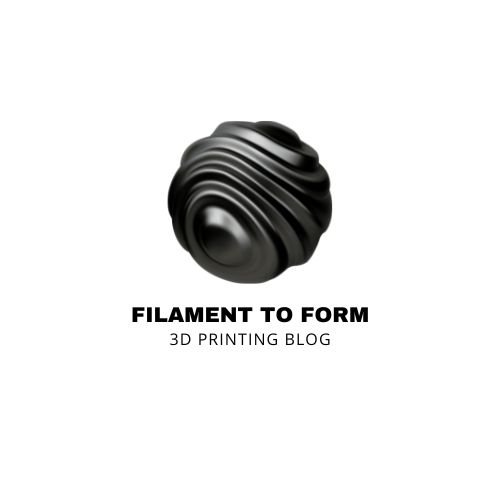
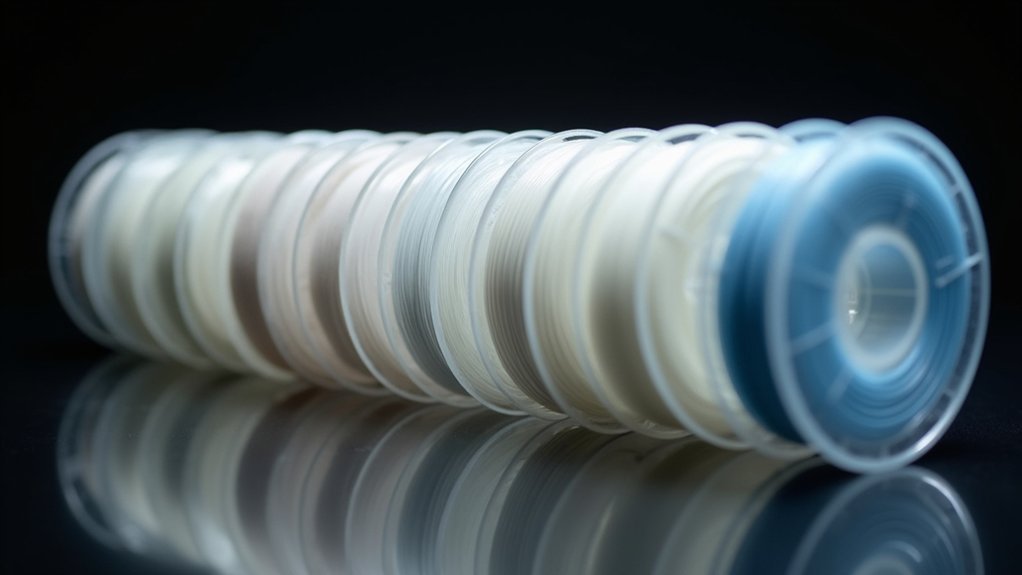
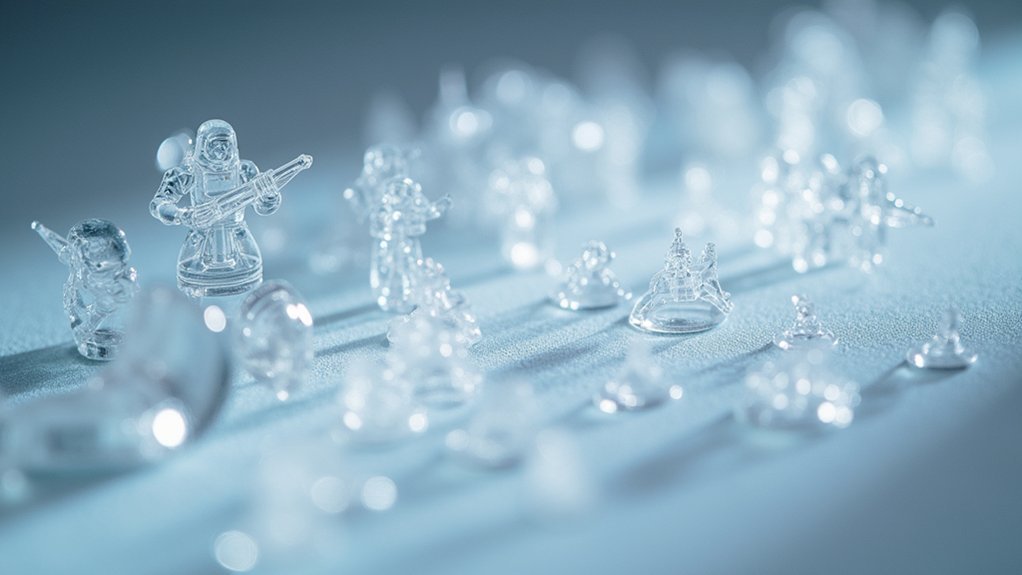
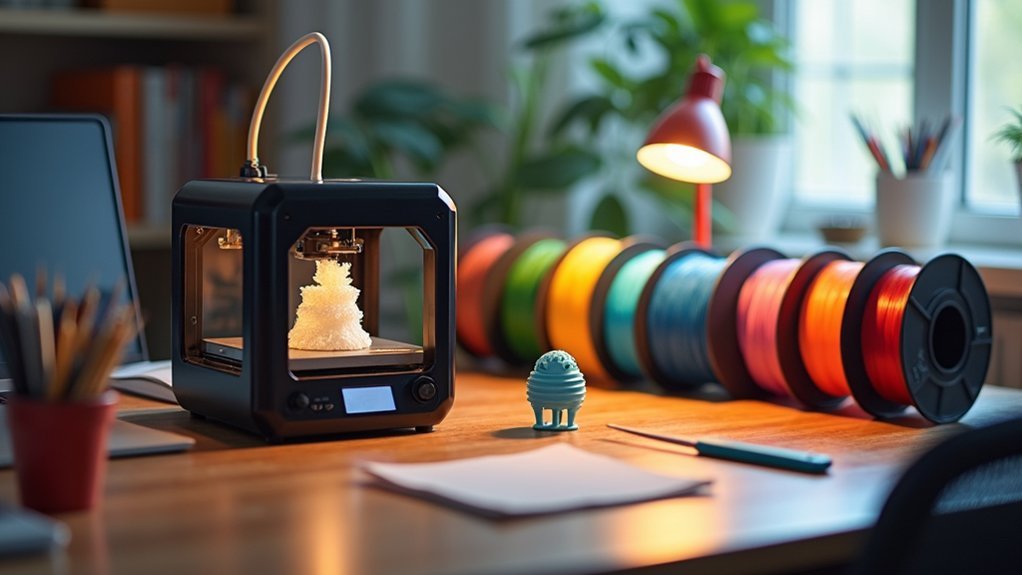
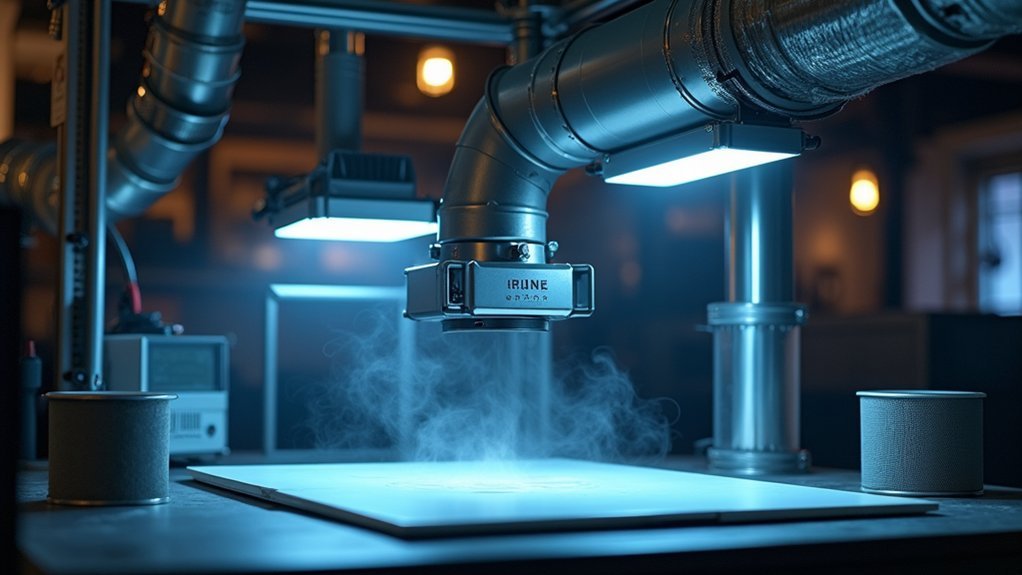
Leave a Reply